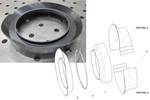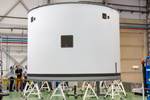Airbus unveils DisruptiveLab to test new decarbonization-focused technologies
Aerodynamic helicopter demonstrator, featuring an aluminum and composites fuselage and composite blades, will focus on improving aircraft performance and reducing environmental footprint.
Photo Credit: Airbus
(Toulouse, France) unveiled the DisruptiveLab at its annual Summit event, a new flying composites-intensive laboratory designed to test technologies destined to improve aircraft performance and to reduce helicopters’ CO2 emissions.
The DisruptiveLab will evaluate a new aerodynamic architecture intended to reduce fuel consumption, as well as pursuing the implementation of hybridization with a fully parallel hybrid propulsion system that enables the battery to be recharged in-flight. The new demonstrator will take to the skies before the end of 2022 in order to begin flight testing and maturing these new technologies.
The lab features an aerodynamic aluminum and composite fuselage, specifically designed to reduce drag and thus reduce fuel consumption, and composite blades integrated into the rotor for a more compact rotor head which reduces drag and therefore improves energy efficiency while lowering the perceived noise level. Its lighter rear fuselage incorporates a streamlined Fenestron tail rotor that Airbus says also contributes to improved performance.
“The DisruptiveLab goes another step further in Airbus Helicopters’ ambitious strategy to reduce the environmental impact of its helicopters and to lead the way towards a sustainable aerospace industry,” Bruno Even, CEO of Airbus Helicopters, says. “The innovative architecture and the fully parallel hybrid propulsion system could only really be tested on a brand new demonstrator in order to verify the combined impact in CO2 reduction which could be as much as 50%.”
The demonstrator is part of the French Council for Civil Aviation Research Conseil’s (CORAC) roadmap and has been partly financed by the French Civil Aviation Authority (DGAC) in the frame of the French Stimulus plan, which is part of the European Plan, Next Generation EU and the France 2030 plan.
Airbus Helicopters’ strategy relies on demonstrators to test and mature new technology in an agile manner. The company started work on its first demonstrator, the FlightLab, in 2020. The FlightLab uses an existing H130 platform and is mainly dedicated to researching and developing technologies related to enhanced autonomy and safety technobricks. On the other hand, the DisruptiveLab will focus on improving aircraft performance and reducing environmental footprint.
Related Content
-
Otto Aviation launches Phantom 3500 business jet with all-composite airframe from Leonardo
Promising 60% less fuel burn and 90% less emissions using SAF, the super-laminar flow design with windowless fuselage will be built using RTM in Florida facility with certification slated for 2030.
-
Plant tour: Aernnova Composites, Toledo and Illescas, Spain
RTM and ATL/AFP high-rate production sites feature this composites and engineering leader’s continued push for excellence and innovation for future airframes.
-
Plant tour: Collins Aerospace, Riverside, Calif., U.S. and Almere, Netherlands
Composite Tier 1’s long history, acquisition of stamped parts pioneer Dutch Thermoplastic Components, advances roadmap for growth in thermoplastic composite parts.






